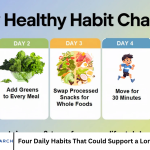It may seem like an everyday phrase — “Hey! What’s on your mind today?” — but this simple question carries a world of meaning. It’s more than just small talk or polite greeting; it’s an open invitation to share your thoughts, feelings, or even your worries. In a world where people often feel disconnected despite being digitally “connected” all the time, such a question has the power to bridge the emotional gap.
Asking someone what’s on their mind shows empathy and genuine interest. It signals that the person cares about your inner world, not just the surface. In relationships, friendships, workplaces, and even casual encounters, opening the door for honest dialogue builds trust and strengthens bonds.
But why does this question matter so much? How does it impact mental health and social connection? And what happens when you’re the one being asked? This article dives deep into the importance of checking in, the role of conversation in wellbeing, and the art of listening and sharing.
Why Asking “What’s on Your Mind?” Matters
At its core, the question invites openness. In many cultures, people are taught to keep feelings to themselves, to be strong, and to avoid burdening others. Yet, when someone asks what you’re thinking or feeling, it gives permission to be vulnerable. This can be especially important in times of stress, confusion, or loneliness.
The simple act of verbalizing thoughts can help organize your feelings and reduce anxiety. Psychologists call this phenomenon “catharsis”—the emotional release that comes from expressing what’s inside. Speaking aloud can make problems feel more manageable, provide new perspectives, and even spark solutions.
Moreover, being asked this question fosters connection. Humans are inherently social beings, wired to seek understanding and acceptance. When someone shows interest in what’s on your mind, it fulfills a basic psychological need to feel seen and heard. This recognition can boost mood, increase feelings of belonging, and strengthen relationships.
Conversations as a Pillar of Mental Health
Talking about what’s on your mind isn’t just about exchanging information; it’s a fundamental part of emotional health. For many, conversation acts as informal therapy. It helps process experiences, release tension, and gain insight.
Studies show that people who regularly talk about their feelings and challenges tend to have lower stress levels and better emotional resilience. Conversely, suppressing emotions can lead to anxiety, depression, and other health issues.
But not all conversations are equal. The quality of interaction matters. Genuine, empathetic listening is crucial. When you share something personal, you want your words to be received without judgment or interruption. This safe space allows deeper understanding and healing.
Responding to the Question: How to Share What’s on Your Mind
When someone asks you, “What’s on your mind today?” it can be tempting to brush off the question with a vague “Nothing much” or “I’m fine.” This is often a protective instinct. Sharing personal thoughts requires vulnerability and trust.
However, opening up even a little can be liberating. It doesn’t mean revealing everything at once or overwhelming the listener. It can be as simple as mentioning a concern, a recent success, or a curiosity. The key is honesty — acknowledging your real state of mind rather than hiding behind a mask.
For those who find it hard to share, it helps to remember that expressing feelings is a skill that improves with practice. Starting small, with trusted people, and using words that feel comfortable can build confidence over time.
Offering Help and Support: The Art of Listening
When someone chooses to share what’s on their mind, responding with kindness and attention makes a world of difference. Active listening means more than just hearing words; it involves focusing fully on the speaker, observing nonverbal cues, and responding thoughtfully.
It’s important to avoid rushing to give advice or fix problems unless asked. Sometimes, what a person needs most is to be heard and validated. Statements like “That sounds really tough” or “I’m here for you” can be incredibly reassuring.
Being patient and respectful of silence also matters. People sometimes need time to find the right words or just want to feel your presence without pressure.
Casual Chat vs. Meaningful Conversations
Not every exchange needs to be deep or emotionally heavy. Casual conversations and light-hearted chats play a vital role in social bonding. They create comfort and rapport, which lay the groundwork for trust.
However, there is value in recognizing when to move beyond small talk to meaningful dialogue. This transition often happens naturally when curiosity, empathy, and openness combine. Asking follow-up questions, sharing your own thoughts, and being genuinely interested encourage deeper connections.
In the age of digital communication, where messages are often short and rapid, meaningful conversation can feel scarce. Yet, even texting or video calls can be opportunities for sincere check-ins and emotional support.
Cultural Perspectives on Sharing What’s on Your Mind
Around the world, cultures vary in how openly people express feelings. Some cultures prioritize emotional restraint, while others encourage open sharing. Understanding these differences is important for respecting communication styles and needs.
The global rise in mental health awareness has started to shift norms. More people now recognize the value of talking about emotions and seeking help without shame. This cultural shift is helping break down barriers and encourage connection.
Practical Tips for Engaging in Meaningful Conversations
Starting a meaningful conversation doesn’t require perfect timing or elaborate preparation. It begins with genuine curiosity and kindness. Asking open-ended questions, showing empathy, and creating safe spaces invite openness.
Sometimes, it helps to share a little of your own experience first, which can encourage others to open up. Listening without judgment and avoiding interrupting creates trust.
If someone seems reluctant to share, don’t push. Respect boundaries while letting them know you’re available whenever they’re ready.
Frequently Asked Questions
Why is asking “What’s on your mind?” such an important question?
This question invites openness and shows genuine care. It signals that you’re interested in what someone is truly thinking or feeling, not just in superficial pleasantries. It can lead to meaningful conversation, deeper connection, and emotional support.
What if I don’t know how to respond when someone asks me what’s on my mind?
It’s okay to feel unsure. Start small. You don’t have to reveal everything — just share a thought, a feeling, or even say, “I’m not sure, but I appreciate you asking.” The goal isn’t to be perfect but to be real.
Is it okay to talk about problems or emotions with friends and not just therapists?
Absolutely. Friends, family, and peers can be powerful sources of support. While therapists are trained professionals, meaningful conversations with trusted people can offer comfort, clarity, and relief. You don’t always need a solution; sometimes being heard is enough.
How can I help someone open up without making them feel pressured?
Create a relaxed and non-judgmental environment. Ask open-ended questions and listen with empathy. Let them know there’s no obligation to share, but that you’re there if and when they want to. Sometimes, just being present is all it takes.
What if I try to connect with someone and they shut down or avoid the conversation
Respect their boundaries. Not everyone is ready to talk, and that’s okay. You can still offer kindness and let them know the door is always open. Often, just knowing someone cares is enough to help someone eventually feel safe enough to talk.
How can I make casual conversations more meaningful?
By being present, curious, and authentic. You can gently guide a conversation by asking how someone’s really doing, what’s been on their mind lately, or what’s something that made them smile or feel challenged. Even light conversations can turn meaningful with genuine attention.
Conclusion
In a fast-paced world filled with noise and distraction, a simple question like “Hey, what’s on your mind today?” is a gentle reminder of human connection. It invites vulnerability, honesty, and care — elements that many people long for but rarely experience in their daily lives.






